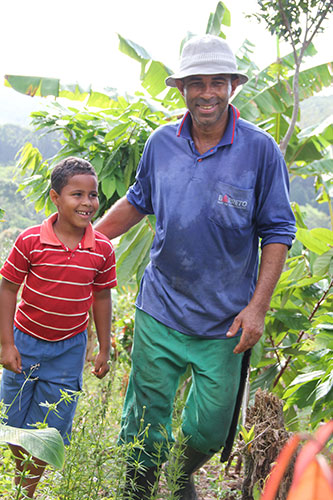 We promote sustainable territorial development through PDCIS, our social program, which includes actions in six integrated fronts, aiming to combat poverty and inequality: education for sustainable development; environmental conservation; economic development; innovation and technology; citizenship and governance, and cohesion and social mobilization.
We promote sustainable territorial development through PDCIS, our social program, which includes actions in six integrated fronts, aiming to combat poverty and inequality: education for sustainable development; environmental conservation; economic development; innovation and technology; citizenship and governance, and cohesion and social mobilization.
PDCIS was created in the Brazilian northeast in 2003, and is a social technology of proven impacts that strengthens family farming, respecting the vocation of the communities that have benefited, leveraging economic growth with inclusion, in harmony with the environment.
Our social program has been implemented in the Southern Bahia Lowlands for almost 20 years. Having proven the impacts of PDCIS, we have established its systematization, facilitating the reapplication of this program in other unequal contexts. Click here and find out more about the practices that we develop in our program. Please note: at the moment, the systematization of our social technology is only available in Portuguese.
Our activities
From our social technology, we have joined forces to combat poverty and inequality, mobilizing the public authorities, private initiative and civil society, to promote sustainable territorial development in vulnerable regions.
This participative governance is strengthened by our work in partnership with civil society organizations in the places where we operate. Together, we have taken on the commitment that young people and their families can live in the countryside, in harmony with the environment.
Do you know what the acronym PDCIS stands for? The program was created by Norberto Odebrecht, our founder, and the acronym in full is the Program of Development and Growth Integrated with Sustainability.
Find out more about our six areas of activity!

- Educação para o desenvolvimento sustentável –
o objetivo desta frente é oferecer às pessoas, especialmente aos jovens, as habilidades, competências e conhecimentos necessários à construção do desenvolvimento sustentável, por meio da promoção da educação contextualizada e de qualidade orientada para a conservação ambiental e sustentabilidade, formação ética e para valores, que constituem a base para o protagonismo juvenil.

- Desenvolvimento econômico –
frente que favorece o desenvolvimento econômico e a inclusão social pelo fortalecimento da agricultura familiar; incentivos à economia rural; apoio nos processos de gestão, produção, beneficiamento e comercialização; promoção de segurança alimentar; incremento de renda; acesso a mercados mais justos; e orientação para reinvestimentos e para estruturação de sistemas produtivos sustentáveis.

- Conservação ambiental –
esta frente estimula a conservação do meio ambiente e da biodiversidade, possibilitando o uso racional dos recursos naturais, com destaque para: proteção dos recursos hídricos, restaurando e conservando matas ciliares e nascentes; promoção do desmatamento evitado; conservação do solo e da água; implementação de práticas agroecológicas, neutralização de carbono e revegetação; e apoio para acesso ao saneamento básico, incluindo a orientação para manejo correto de insumos e de resíduos.

- Inovação e tecnologia –
visa fomentar a inovação no campo, desenvolvimento de novos produtos e de comercialização; aplicação de tecnologias para aumento de produtividade; diversificação de cultivos; e disseminação de boas práticas agrícolas e agroecológicas, incluindo a reconversão de áreas em sistemas agroflorestais.

- Coesão e mobilização social –
esta frente possibilita a união das pessoas em torno de objetivos comuns atingidos pelos estímulos ao engajamento em organizações socioprodutivas; formação de novas lideranças; incentivo à permanência no campo; empoderamento das comunidades; formação de uma consciência coletiva; e fortalecimento da identidade cultural, autoestima e senso de pertencimento das pessoas a suas comunidades.

- Cidadania e governança –
a prioridade desta frente é tornar o cidadão consciente do conjunto de direitos relativos ao bem-estar econômico-social, possibilitando o acesso às políticas públicas e de crédito e o fortalecimento do Sistema de Garantia dos Direitos da Criança e do Adolescente.
PDCIS in numbers


 We promote sustainable territorial development through PDCIS, our social program, which includes actions in six integrated fronts, aiming to combat poverty and inequality: education for sustainable development; environmental conservation; economic development; innovation and technology; citizenship and governance, and cohesion and social mobilization.
We promote sustainable territorial development through PDCIS, our social program, which includes actions in six integrated fronts, aiming to combat poverty and inequality: education for sustainable development; environmental conservation; economic development; innovation and technology; citizenship and governance, and cohesion and social mobilization.





.png)
.png)
.png)
.png)
.png)
.png)
.png)
.png)

